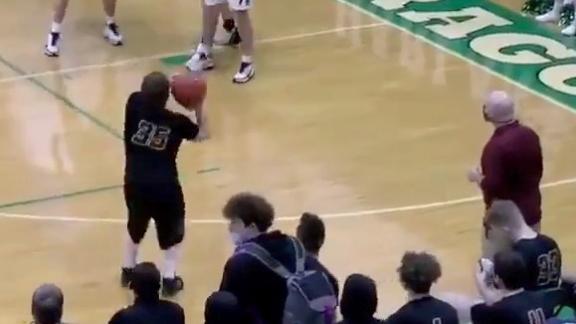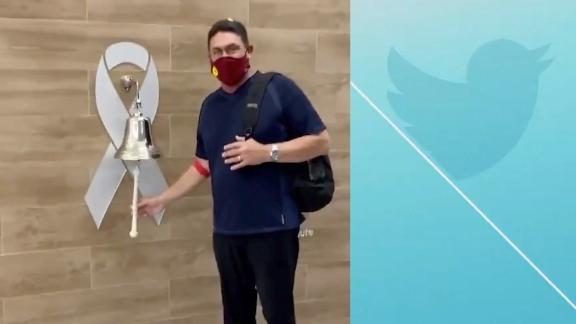In the summer of 2008, Drug Enforcement Administration agents began hearing troubling stories about U.S. servicemen who were showing up in emergency rooms, complaining about heart palpitations and suicidal thoughts. When the agents looked into the incidents, they found the servicemen had taken a new supplement being sold legally under the names K-2 and Spice. When agents had samples tested, they found it was a synthetic form of marijuana that was 10 times more powerful than the natural version, and 10 times as dangerous.
Over the next few years, the supplements migrated into the sports world as athletes discovered that conventional drug tests could not detect them. As one NFL veteran
told Yahoo! Sports last year: "I go straight weed in the off-season. Then, in-season, when they test, I go to [K-2]."
There have been high-profile college cases, too: Former Auburn running back Michael Dyer testified in court that he consistently smoked synthetic marijuana during his career. And
LSU's Tyrann Mathieu was one of three Tigers who tested positive for synthetic marijuana and were suspended.
But this week, the party may be over for chemical cannabis. A panel of negotiators for the U.S. House and Senate has agreed to an amendment to a
pending bill that will make synthetic marijuana a Schedule 1 drug, alongside the natural version and heroin, for example.
The reason is obvious: The American Association of Poison Control Centers reported receiving 6,959 calls related to synthetic marijuana in 2011, up from 2,906 in 2010. And while synthetic pot may not be considered performance enhancing, DEA officials say it is being made in the same Chinese chemical labs that have flooded the supplement market with steroids over the past decade.
In 2007,
ESPN The Magazine went to a pharmaceutical expo in Shanghai to see firsthand how easy it was to buy bulk quantities of steroids and have them shipped to the United States in canisters labeled as "watermelon extract." These days, the same chemists are adding cannabinoid compounds to their product lines, officials say.
The impact was chronicled last year in a report by Yahoo! Sports, which learned about three student-athletes who broke apart cigarettes, mixed in K-2, and then started smoking. One student with no past medical history had a seizure and was found outside his dorm convulsing. When asked why he did it, the student-athlete told campus police, "I didn't think it would be that much of a rush. I had no control over my body in that I could see but could not talk or speak."
The pending legislation, which will be voted on in the next week, targets 15 separate cannabinoid compounds. It also covers nine hallucinogens from a family of drugs known as 2-C. One of those, sold under the street name Europa,
was blamed in the death of a Minnesota teen who overdosed during a spring break party in March 2011.
This new effort, however, may prove hard to enforce. As the DEA learned at the height of the steroid era, crafty chemists can tweak their designs by adding a molecule here or there so that their products no longer look like the specific chemicals that Congress entered into the Federal Register.
"As we saw with anabolic steroids, controlled substance laws are very compound specific," says William Llewellyn, author of "Anabolics," a steroid reference guide, and a supplement industry veteran. "The new synthetic narcotic can easily be modified into new compounds."
Adds DEA spokesman Lawrence Payne: "With so many advances in chemistry and science, what used to take years to change now takes months, weeks, or even days." As a result, Payne concedes, "This is not something we can legislate or enforce our way out of."
In other words, the game of cat and mouse between the chemists and the cops continues.
The File is interested in hearing from any athlete who has had an experience with K-2 or any of the other substances described above.
Email us.
-- Shaun Assael
Other Files
For a quick guide to who's who in cycling, it's hard to beat
this chart from velorooms.com. … In case anyone is wondering whether Floyd Maywether and Miguel Cotto fought with anything other than heart, the U.S. Anti-Doping Agency has
this answer. … The Sydney Morning Herald has a
remarkable story about the Indonesian beachside town of Pattaya, which is marketing itself as a vacation haven for steroids. … Is there doping in tennis? The Agence Franšaise de Lutte contre le Dopage, otherwise known as the French Anti-Doping Agency, wants to find out. So
it is asking for a greater role in matches played in France. "Regarding the Grand Slams, the [International Tennis Federation] wants to have a monopoly," explains Bruno Genevois, director of the agency. "But we want to advance on other tournaments."




